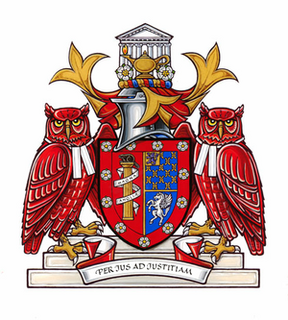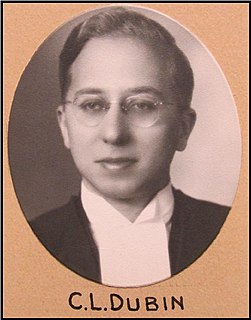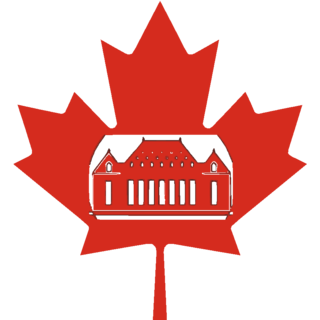Related Research Articles

The Supreme Court of Canada is the highest court in the judicial system of Canada. It comprises nine justices, whose decisions are the ultimate application of Canadian law, and grants permission to between 40 and 75 litigants each year to appeal decisions rendered by provincial, territorial and federal appellate courts. The Supreme Court is bijural, hearing cases from two major legal traditions and bilingual, hearing cases in both official languages of Canada.
The University of Toronto Faculty of Law is the law school of the University of Toronto. The Faculty's admissions process is the most selective of law schools in Canada and is one of the most selective in North America. The Faculty has consistently been ranked as the top law school for Common Law in Canada by Maclean's since it began to publish law school rankings. The Faculty offers the JD, LLM, SJD, MSL, and GPLLM degrees in law.

The chief justice of Canada is the presiding judge of the nine-member Supreme Court of Canada, the highest judicial body in Canada. As such, the chief justice is the highest-ranking judge of the Canadian court system. The Supreme Court Act makes the chief justice, a Crown in Council appointment, meaning the Crown acting on the advice of the prime minister and minister of justice. The chief justice serves until they resign, turn 75 years old, die, or are removed from office for cause. By tradition, a new chief justice is chosen from among the court's incumbent puisne justices.

Osgoode Hall Law School, commonly shortened to Osgoode, is the law school of York University in Toronto, Ontario, Canada.

Bora Laskin was a Canadian jurist who served as the 14th chief justice of Canada from 1973 to 1984. Laskin was appointed a puisne justice of the Supreme Court in 1970, and served on the Ontario Court of Appeal from 1965 to 1970. Before he was named to the bench, Laskin worked as a lawyer and in academia.

Sir Lyman Poore Duff was the eighth Chief Justice of Canada. He was the longest serving justice of the Supreme Court of Canada.

Roland Roy McMurtry, is a Canadian lawyer, retired judge and former politician in Ontario. He was a Progressive Conservative member of the Legislative Assembly of Ontario from 1975 to 1985, serving in the cabinet of Bill Davis as Attorney General and as Solicitor General. After leaving politics, McMurtry was High Commissioner of Canada to the United Kingdom between 1985 and 1988. He became a judge in 1991 and was appointed as Chief Justice of Ontario in 1996. McMurtry retired from the bench in 2007 and returned to the private practice of law.
Frank Iacobucci is a former Puisne Justice of the Supreme Court of Canada from 1991 until his retirement from the bench in 2004. He was the first Italian-Canadian, allophone judge on the court. Iacobucci was also the first judge on the Supreme Court to have been born, raised and educated in British Columbia. Iacobucci has had a distinguished career in private practice, academia, the civil service and the judiciary.
The Court of Appeal for Ontario is the appellate court for the province of Ontario, Canada. The seat of the court is Osgoode Hall in downtown Toronto, also the seat of the Law Society of Ontario and the Divisional Court of the Ontario Superior Court of Justice.
Ronald Martland, was a Canadian lawyer and Puisne Justice of the Supreme Court of Canada. He was the second Albertan appointed to the Supreme Court of Canada, taking the place of Justice Nolan, who died after only a short time on the Court.

Wishart Flett Spence, was a puisne justice of the Supreme Court of Canada.

Charles Leonard Dubin was a Canadian lawyer and former Chief Justice of Ontario. He led the Dubin inquiry into the use of steroids by athletes.

The Ontario Court of Justice is the provincial court of record for the Canadian province of Ontario. The court sits at more than 200 locations across the province and oversees matters relating to family law, criminal law, and provincial offences.
Torys LLP is a Canadian international corporate law firm with offices in Toronto, Calgary, New York, Montreal and Halifax. The firm acts for a wide range of commercial clients and financial institutions in Canada, the United States, and globally.

The Supreme Court of Canada was founded in 1875 and has served as the final court of appeal in Canada since 1949. Its history may be divided into three general eras. From its inception in 1875 until 1949, the Court served as an intermediate appellate court subject to appeal to the Judicial Committee of the Privy Council in Britain. Following 1949, the Court gained importance and legitimacy as the court of last resort in Canada, establishing a greater role for the Canadian judiciary. In 1982, the introduction of the Canadian Charter of Rights and Freedoms significantly changed the role of the Court in Canadian society, by providing the Court with greater powers of oversight over Parliament and through formal recognition of civil rights including aboriginal rights and equality rights.
John Douglas Arnup, was a Canadian judge on the Court of Appeal for Ontario, who is best known for having pioneered universal legal aid in Ontario.
WeirFoulds LLP is a Canadian law firm based in Toronto, Ontario. The firm specializes in litigation, corporate, property and government law. It is one of Canada's oldest law firms.
John Ivan Laskin is a former justice of the Court of Appeal for Ontario from 1994–2018. He is a graduate of University of Toronto Faculty of Law. Prior to the court he practised law for 23 years.
The Bora Laskin Faculty of Law is the professional school of law of Lakehead University in Thunder Bay, Ontario, Canada.
Malliha Wilson is a Tamil Canadian lawyer who served as the Assistant Deputy Attorney General of the Government of Ontario from April 2008 to November 2016. She was the first visible minority to hold that office.
References
- 1 2 3 "The Honourable John B. Laskin". Federal Court of Appeal website. 10 April 2018. Archived from the original on 2021-09-19. Retrieved 2020-12-05.
Justice John B. Laskin practised litigation for more than 30 years in the Toronto office of Torys LLP.
- 1 2 MacCharles, Tonda (2011-05-16), "Harper government to name two new high court judges", Toronto Star, archived from the original on 2020-01-20, retrieved 2021-09-19,
Observers also toss out several names in private legal practice in Ontario, including several with Bay Street experience and strong backgrounds in commercial law: Sheila Block, Tom Heintzman, Neil Finkenstein, and John B. Laskin (nephew of former Supreme Court of Canada Chief Justice Bora Laskin).
- ↑ Girard, Philip (2005), Bora Laskin: Bringing Law to Life, University of Toronto Press, ISBN 9781442616882,
Bora Laskin's children, the Hon. John I. Laskin and Barbara Laskin Plumptre, have considered writing about their father, and I hope that one day they will publish a memoir of him.